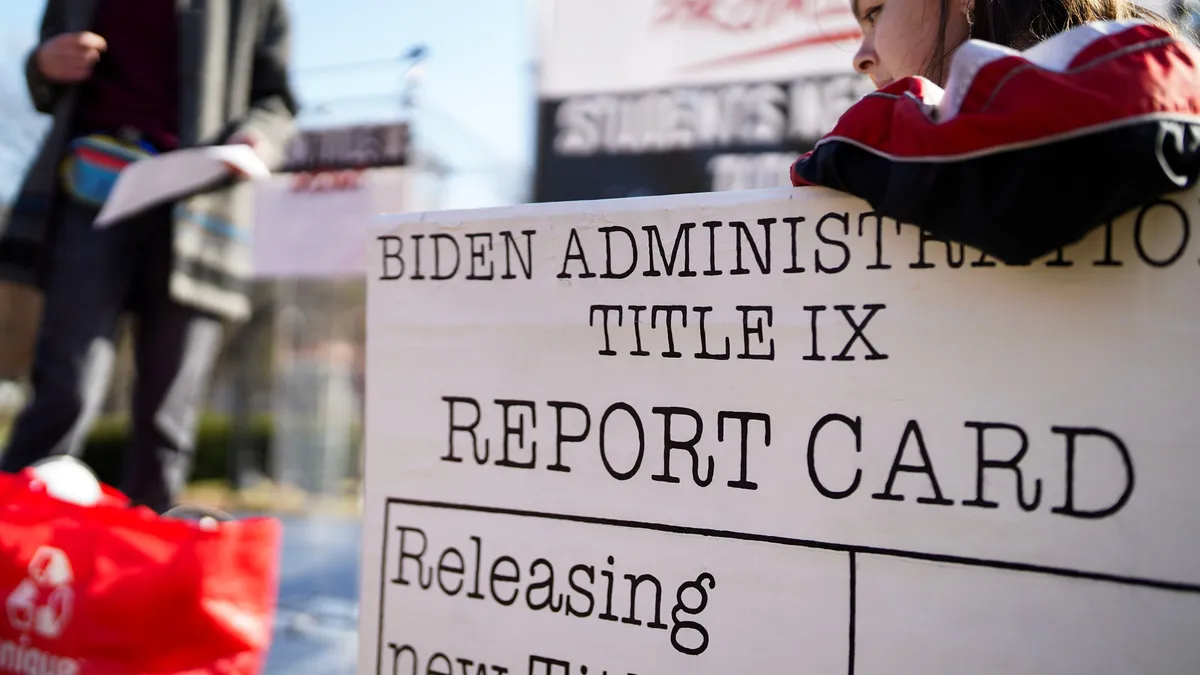School systems are set to change their Title IX policies for the third time across three presidential administrations in most parts of the country next month.
The latest incarnation — the Biden administration's Title IX rule protecting LGBTQI+ students which was unveiled in April — will give schools more flexibility than the 2020 regulations implemented under former Secretary of Education Betsy DeVos. Title IX experts have said some of those changes, like allowing a single-investigator model for investigating violations, are also more tailored to the needs of K-12 settings.
However, recent injunctions temporarily blocking the rule in at least 15 states and the department's repeated requests to the federal courts to implement at least part of the rule have complicated its implementation at the eleventh hour.
As a result, the upcoming changes are triggering a wave of questions from Title IX coordinators, advocates, lawyers and school district leaders ahead of the Aug. 1 implementation deadline. Here are five things you need to know.
1. More choices to make and an uptick in cases on horizon
The rule expands Title IX beyond sex-based harassment to many additional aspects of sex discrimination, such as disparate treatment based on sex in all aspects of K-12, like grading, educational opportunities, discipline, athletics and more, said Jacqueline Litra, a Title IX lawyer and partner at law firm Fagen Friedman & Fulfrost who advises school districts on Title IX investigations.
It also requires school districts to actively monitor programs and activities for sex discrimination, identify barriers to reporting, and address them, Litra said in an email.
"If I were Title IX coordinator at a district or an assistant superintendent or something like that, I'd want to be warning folks that we might see a lot more cases than we're used to," said Kayleigh Baker, a Title IX consultant for TNG Consulting and a member of the Association of Title IX Administrators advisory board. "That doesn't necessarily mean our school district is less safe or anything like that, but I think that that's going to be a result of these regulations."
School districts may also have more choices to make because the 2024 regulations offer more flexibility than its predecessor, said Baker.
"These regulations are a different animal than the 2020 regulations," Baker said. While the 2020 regulations were more rigid in their procedural guidelines, the new rule gives schools options like whether they want to provide an informal hearing process.
The 2024 rule also allows schools to tailor their Title IX policies based on their size, administrative structures and students’ ages.
"But with flexibility comes choices, and I think that that's going to be an adjustment for folks, and it's also going to present some interesting considerations," said Baker.
2. Injunctions don't prevent schools from adopting 2024 policies
While most of the country will be implementing the rule, a large swath of states is contending with court-imposed temporary blocks. In at least 15 states with a temporary injunction, the U.S. Department of Education is prohibited from enforcing the rule. The rule may also be blocked in over 400 specific schools, some of which are located outside of those 15 states.
The administration this week asked the Supreme Court to keep in place the uncontested parts of the rule in at least 10 states as the issue works its way through the federal court system, challenging the lower federal court judges that have so far rejected that request. Kansas District Court Judge John Broomes went so far as to suggest that the Aug. 1 enforcement date be delayed to avoid a patchwork of policies nationwide.
In absence of such a delay, however, schools in states with injunctions may still opt to implement, or at least prepare for, the 2024 rule.
"I think it's important for schools to not find themselves in a situation where they think they wouldn't have to implement the rule because of these injunctions," said Shiwali Patel, senior director of safe and inclusive schools for the National Women's Law Center, where she leads policy development addressing gender-based harassment. "And then the injunction is lifted, and now they have to scramble to get these rules in place."
However, it is more complicated for schools in states that have explicitly advised their districts to disregard the rule or have local laws conflicting with the 2024 regulations.
Those school boards are in an "awkward position" of juggling their local needs against state and federal laws, said Verjeana McCotter-Jacobs, executive director and CEO of the National School Boards Association.
And in fact, many schools have begun working on their 2024 Title IX policy despite not expecting it to be implemented right away, said Baker. "Even if that's going on a bookshelf somewhere and won't be pulled out until we have more information, they're sort of hedging their bets that way."
3. Districts may still adopt parts of the rule in injunction states
There are some parts of the rule that schools in states with injunctions could still choose to adopt. For example, while both the 2020 and 2024 regulations require supportive measures, the 2024 rule allows students to challenge them. Supportive measures are designed to ensure students who say they were impacted by sexual harassment can still continue their education without interruption. They can range from changing class schedules to getting extensions on deadlines.
If a school wanted to put the ability for students to challenge supportive measures into their new policy, that wouldn't necessarily conflict with the 2020 regulations,said Baker. "We always say that the federal regulations usually set the floor of compliance, not, like, a best practice ceiling."
And while conservative leaders or laws in conservative states may dissuade districts from including LGBTQ+ protections under Title IX, school districts can still find ways to protect these students. Bullying and harassment policies, for example, can often cover bullying on the basis of LGBTQ+ identity.
"There are tons of types of bullying that are not protected by federal civil rights law," said Jackie Gharapour Wernz, an education civil rights consultant for Education Civil Rights Solutions, which provides Title IX compliance training. Wernz previously served as a civil rights attorney for the U.S. Department of Education’s Office for Civil Rights in both the Obama and Trump administrations.
As an example, she said, federal civil rights law doesn't necessarily protect against bullying based on socioeconomic status or their weight. "But we wouldn't allow that. So just use your head and don't allow people to be bullied and harassed, right?"
Wernz also suggested that schools, especially those in states with temporary injunctions, keep their Title IX policies general for now.
"The regulations actually only require a very few things to be in policy," she said. "People should probably be thinking, ‘What if we put in place a policy that didn't have to be changed between these two rules?’"
Schools could, for instance, keep their policies general, but add a different appendix or adopt different administrative procedures based on the changed rule, Wernz said.
4. The 2024 regulations are not retroactive
Title IX experts speculate that the 2020 regulations may continue to be implemented in states facing injunctions. However, less than two weeks ahead of the Aug. 1 implementation date, the U.S. Department of Education has not released guidance for schools in states with injunctions.
The Education Department did not answer K-12 Dive's repeated requests about whether it plans to stick with enforcing the 2020 regulations in those states or whether it will provide additional guidance for those states.
In the meantime, it's important for school districts everywhere to remember that 2020 regulations will still apply to any conduct prior to Aug. 1, said Baker.
"For the foreseeable future, injunction or not, these 2024 regulations are not retroactive," she said. "We've got to still keep up somehow with 2020 and make sure that we have a policy that is compliant with 2020 "
5. Rely on legal experts for case-by-case assessment
School districts may have to put some Title IX complaints under the microscope, such as those related to bathroom and locker room access or pronoun changes. "That's where you really have to do that case-by-case analysis, considering both federal law and state law," said Wernz.
Title IX and district policy experts are stressing that school districts work with Title IX lawyers or consultants to implement the federal regulations, as well as local counsels who can help tailor them to hot-button issues according to state and district policies.
"The best advice that I could give to any of the schools is, ‘This is a time to buddy up with your legal counsel and really work through the injunctions,’" said Baker.






















